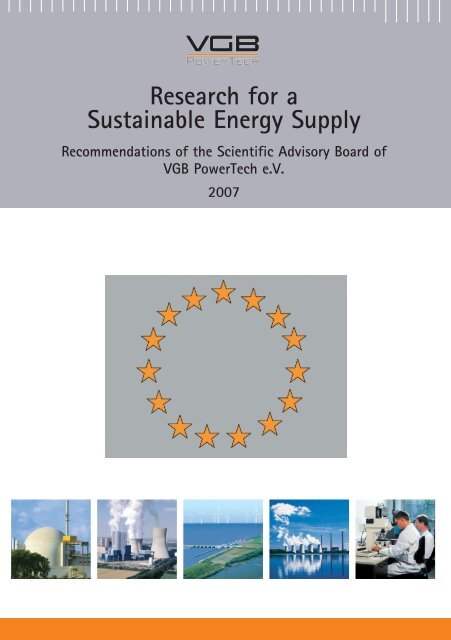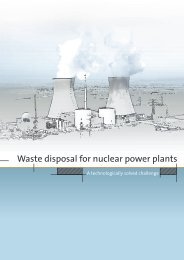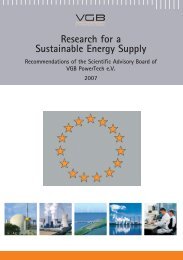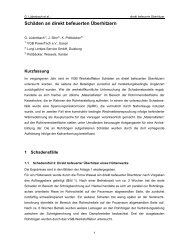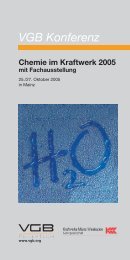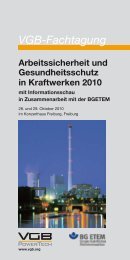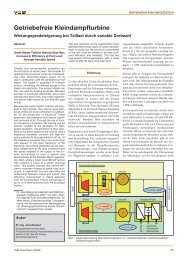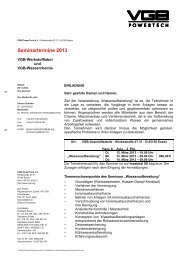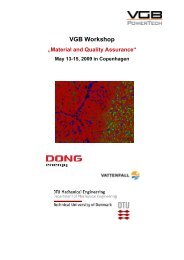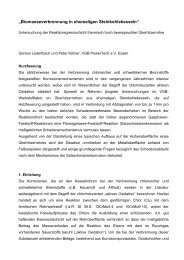Research for a Sustainable Energy Supply - VGB PowerTech
Research for a Sustainable Energy Supply - VGB PowerTech
Research for a Sustainable Energy Supply - VGB PowerTech
Create successful ePaper yourself
Turn your PDF publications into a flip-book with our unique Google optimized e-Paper software.
<strong>Research</strong> <strong>for</strong> a<br />
<strong>Sustainable</strong> <strong>Energy</strong> <strong>Supply</strong><br />
Recommendations of the Scientific Advisory Board of<br />
<strong>VGB</strong> <strong>PowerTech</strong> e.V.<br />
2007
• Secure energy supply is of utmost importance to any modern economy, vital <strong>for</strong> the economic<br />
capacity and <strong>for</strong> securing appropriate conditions of living and the welfare of society.<br />
• Thus, energy is a paramount topic <strong>for</strong> future development. <strong>Energy</strong> has to be made available<br />
in an environmentally friendly and socially compatible way. There<strong>for</strong>e, it is being recommended<br />
to spend energy economically in an ecologically sound manner in order to prolong<br />
the utilisation of limited resources. Substitutes are to be identified in due time <strong>for</strong> sources<br />
of energy that are petering out.<br />
• <strong>Research</strong> and development are the key <strong>for</strong> the solution of energy-related problems within<br />
the scope of overall concepts that also comprise increases in efficiency, protection of<br />
the environment and identification and development of new sources of energy. <strong>Research</strong><br />
funds are not to be used in favour of or against any <strong>for</strong>m of energy but are to be allocated<br />
evenly because it goes without saying that research results are not predictable.<br />
• The funds <strong>for</strong> energy research – public funds and industry budgets – and the related direct<br />
and indirect consequences, i.e. the number of junior researchers and students, are far from<br />
meeting the employment requirements of energy engineering. A close link between industry<br />
and universities in the field of energy engineering and natural sciences to support<br />
training and education is indispensable. Besides, social and scientific acceptance is often<br />
missing <strong>for</strong> this demanding and sophisticated technology.
<strong>Research</strong> <strong>for</strong> a<br />
<strong>Sustainable</strong> <strong>Energy</strong> <strong>Supply</strong><br />
Recommendations of the Scientific Advisory Board<br />
of <strong>VGB</strong> <strong>PowerTech</strong> e.V.<br />
2007<br />
Executive Summary<br />
In a period of rapid change in the European energy supply, new political strategies to develop<br />
sustainable energy technologies are required. Adequate funding of research provided by the<br />
EU and the EU member states is a precondition <strong>for</strong> industrial implementation, commercial use<br />
and export of technologies.<br />
On this behalf, the Scientific Advisory Board of <strong>VGB</strong> <strong>PowerTech</strong> expresses its view of<br />
the situation, its concerns and suggestions. Thus, the members of the Advisory Board, representatives<br />
of a variety of technical disciplines and numerous European universities, intend<br />
to elucidate the university perspective and bring it into the discussion between politics and<br />
industry.<br />
An intensive discussion on the following problems of future energy supply, and hence the<br />
energy research situation, is urgently needed. Facts and discussion points are<br />
• how to ensure energy supply by sustainable use of all available primary energies,<br />
• how to define a conclusive way to reduce CO2 emissions,<br />
• withdrawal of utilities and manufacturing companies from pre-competitive research activities,<br />
• how to meet losses in public acceptance, resulting in insufficient numbers of students and<br />
junior staff,<br />
• a far too low priority of energy research within the European <strong>Research</strong> Area,<br />
• a decrease of specific national energy research.<br />
From the Advisory Board’s point of view, an immediate R&D consensus between politics and<br />
industry is regarded as necessary, taking into account all future possibilities and constraints<br />
of energy supply. This paper should also demonstrate contributions to be expected from university<br />
research.<br />
1
Contents<br />
1 <strong>Energy</strong> supply – status<br />
2 The future of energy supply – predictions<br />
3 European energy research policy – status<br />
4 Education of engineers and junior research staff<br />
5 Recommendations<br />
Annex: Members of the <strong>VGB</strong> Advisory Board<br />
1 <strong>Energy</strong> supply – status<br />
The liberalisation of the energy market and, consequently the “unbundling” of the value adding<br />
chain, have already induced considerable business restructuring processes and extreme<br />
adaptations to utilities and plant manufacturers. The energy industry was very cautious under<br />
these circumstances. Thus, enormous investments – which were not made in the past – are<br />
required today to meet the increased and still increasing demand in energy, to cope with the<br />
changed generation structure and the aging of installed electricity generation and transport<br />
facilities. In some countries long delayed new power plant construction programmes were<br />
launched only recently. It is being estimated that in the next 20 years investments of nearly<br />
1,000 billion Euro will be needed. The economies of the EU will have to accept this challenge.<br />
Practically all European states depend more or less on energy imports. In its Green Paper<br />
“Towards a European strategy <strong>for</strong> the security of energy supply” (published in November 2000),<br />
the European Commission emphasised this fact in its 2006 version. The degree of dependency<br />
on energy imports is expected to grow from some 50 to about 70 % in the next 20 years.<br />
This dependency is differing according to each source of energy. The evaluations will also have<br />
to take into account the circumstances in the supply countries. This situation is very striking<br />
<strong>for</strong> natural gas. It is expected that the import dependency of the EU on this source of energy<br />
will increase in the next two decades to more than 80 % and that Russia will extend its dominating<br />
role as the most important gas supplier <strong>for</strong> the EU member states.<br />
The worldwide energy demand will further increase. According to <strong>for</strong>ecasts, it is assumed that<br />
the primary energy demand will increase by some 60 % in about three decades. This is particularly<br />
obvious in threshold countries like China and India. Annual economic growth rates<br />
partly reach double-digit numbers; they all require an increase in primary energy production<br />
of at least the same size. Today, these countries already need net imports of some primary<br />
sources of energy. Under these circumstances, the problems of resources of individual primary<br />
sources of energy will aggravate and a global competition will result. This problem can partly<br />
be alleviated by efficient energy application.<br />
The prices <strong>for</strong> energy – but also other raw materials – will increase. Natural gas and fuel oil<br />
prices have doubled in Europe within a few years and due to increasing demand the situation<br />
will not relax. This is connected with partly serious effects on some energy conversion processes<br />
where costs highly depend on the costs of the input energy (e.g. gas or coal).<br />
2
For reasons of climate protection, the CO2 emissions have to be decreased worldwide. With<br />
the ratification of the Kyoto Protocol reduction targets <strong>for</strong> greenhouse gases were fixed, although<br />
large polluter countries have not yet ratified the Protocol and are still not obliged to<br />
decrease emissions. Reduction targets beyond the scope of the Kyoto Protocol are being debated<br />
vigorously.<br />
The EU committed itself to lead the way to the reduction of greenhouse gas emissions. An important<br />
instrument <strong>for</strong> meeting the Kyoto targets <strong>for</strong> parts of the energy industry is the implementation<br />
of emissions certificate trading. It is planned to extend this scheme to other<br />
energy businesses. For reasons of climate protection and to reduce its import dependency, the<br />
EU also wishes to increase the share of renewables. Not only <strong>for</strong> primary energy consumption,<br />
but also <strong>for</strong> individual areas like electricity generation or engine fuels, supply targets were<br />
agreed upon <strong>for</strong> 2010 that require a minimum share of renewables. The individual solutions<br />
are up to the member states and are dealt with differently. However, it is a fact that<br />
thanks to the increased application of renewables and nuclear power the consumption of<br />
fossil primary energy sources can be reduced and thus the resources can be saved, i.e. less CO2<br />
emissions are discharged.<br />
There is consensus about the fact that energy efficiency has to be further increased on the generation<br />
as well as on the consumption side. Increased energy efficiency will in turn reduce<br />
consumption of primary energy, greenhouse gas emissions, its effect on the environment and<br />
import dependency. The questions in connection with zero-CO2 primary sources of energy are<br />
considered differently. This applies to renewables and to a larger extent to nuclear energy. Besides,<br />
technologies are being developed to separate CO2 in power plant processes and to store<br />
it <strong>for</strong> the long term in geological <strong>for</strong>mations. These technologies will be able to contribute<br />
to emission reduction in the energy industry in about 20 years at the earliest.<br />
2 The future of energy supply – predictions<br />
In most <strong>for</strong>ecasts of the future development of the EU, it is assumed that power consumption<br />
will increase faster than consumption of primary energy. Another assumption is that<br />
future power consumption will grow proportionally to the gross national product. Thus, power<br />
demand intensity will increase, whereas the intensity of primary energy demand – that is the<br />
value related to the gross national product – will decrease. IEA 1 is assuming annual growth<br />
rates of primary energy consumption until 2030 of 0.7 % <strong>for</strong> the EU and 1.7 % worldwide.<br />
Accordingly the increase in electricity generation amounts to 1.3 % <strong>for</strong> the EU and 2.5 %<br />
worldwide. The share of fossil primary sources of energy will even increase in the EU and<br />
worldwide. This is mainly due to the decreasing share of nuclear energy in some countries that<br />
is only partly made up by renewables.<br />
Electricity demand can be covered by fossil fuels, nuclear energy or renewables. In 2002 the<br />
world gross electricity generation amounted to 16,074 TWh, 65.3 % of which were based on<br />
the fossil fuels coal, oil and gas, 16.5 % on nuclear energy, 16.2 % on hydro power and 2.0 %<br />
on other renewables. The corresponding data <strong>for</strong> the EU are 2,986 TWh with 54.4 % fossil<br />
fuels, 32.2 % nuclear energy, 10.1 % hydro power and 3.3 % other renewables. Fossil primary<br />
sources – mainly natural gas – of energy that are consumed in electricity generation will<br />
have higher growth rates. In total the share of fossil fuels spent <strong>for</strong> power generation will<br />
increase by 5 % worldwide and in the EU until 2030.<br />
________<br />
1 Source: IEA World <strong>Energy</strong> Outlook 2004<br />
3
Against this background, enormous endeavours have to be made to protect the climate. The<br />
reduction of CO2 emissions – while energy consumption and the share of fossil fuels are increasing<br />
– will only be possible in exceptional cases. Thus, the increase of energy efficiency is<br />
most important in the short and medium term, both on the generation and consumption<br />
side.<br />
3 European energy research policy – status<br />
The “White Book” on renewables issued by the EU in November 1997 has set the target to<br />
double the use of renewables in the period 1990 to 2010. “An <strong>Energy</strong> Policy <strong>for</strong> Europe” of the<br />
EU from January 2007 requires a share of renewables of 20 % <strong>for</strong> the year 2020 as binding<br />
target. Today, the amount of renewables in electricity generation is less than 7 %. Even if this<br />
target will be met and the energy saving measures will be implemented successfully it will not<br />
be possible to cover the demand securely and sustainably with today’s technologies. Thus, research<br />
is required to strengthen the ef<strong>for</strong>ts in order to use existing sources of energy more efficiently<br />
and to develop new energy conversion technologies.<br />
The European industry managed in the past to take a leadership role in the construction of<br />
energy conversion plants with high energy efficiency and high environmental standards. One<br />
of the most prominent events of these joint activities was the increase of the efficiency of<br />
coal-fired power plants in Europe by nearly 10 % points. Efficiencies of more than 45 % in<br />
coal-fired steam power plants and nearly 60 % in combined gas and steam power plants on<br />
natural gas basis demonstrate impressively the state of the art that is also being implemented<br />
in the new power plant construction programme.<br />
As already mentioned, the European energy policy is coined by the achievement of the climate<br />
protection targets and the concern about the growing European dependency on energy<br />
imports. These problems were partly taken into account by the 7th Framework Programme of<br />
the “European <strong>Research</strong> Area (ERA)” <strong>for</strong> the years 2007 to 2013. In comparison to the 6th<br />
Framework Programme, where the development of energy conversion technology was only a<br />
sub-issue within the scope of “<strong>Sustainable</strong> development, global change and eco system” and<br />
thus not a primary target within the sense of the Green Paper, energy research is now enjoying<br />
a much higher significance.<br />
The 7th Framework Programme mainly comprises four specific programmes (co-operation,<br />
ideas, people, and capacities).<br />
Each of these specific programmes is connected to a certain purpose, an own structure and<br />
individual application conditions. <strong>Energy</strong> research now received an own emphasis within the<br />
scope of the specific programme “Co-operation”. It is the objective to adjust the energy industry<br />
that is mainly based on fossil fuels to a more sustainable supply based on a broad energy<br />
mix. The focus is on technologies with low or zero CO2 emissions in connection with improved<br />
energy efficiency and rational energy utilisation in order to meet the challenges of supply<br />
security and climate change and to simultaneously increase the competitiveness of European<br />
companies.<br />
Apart from hydrogen and fuel cells, research funding is concentrating on the production of fuels<br />
derived from renewables, renewables-based electricity generation, renewables <strong>for</strong> heating<br />
and refrigeration purposes, intelligent energy networks, knowledge and facts <strong>for</strong> political decision<br />
making, energy efficiency and energy savings and <strong>for</strong>tunately also CO2 separation and<br />
storage <strong>for</strong> low-emission power generation as well as clean coal technologies.<br />
4
In total it can be ascertained that the financial budget in the field of energy research – however<br />
commencing from a low level – was extended. Against the background of the importance<br />
of the topics energy and climate protection this positive development cannot be considered<br />
sufficient and calls <strong>for</strong> further intensification and action.<br />
4 Education of engineers and junior research staff<br />
By the end of the nineties energy and energy supply were of minor interest in the broad public<br />
perception. <strong>Energy</strong> was available and energy engineers were dealing with it in secrecy. That<br />
situation was particularly striking at universities, because the majority of students did not<br />
take any interest in engineering courses apart from “modern” fields like in<strong>for</strong>mation and communication<br />
technology.<br />
After a couple of years the broad public opinion has changed. <strong>Energy</strong> in general and its supply<br />
have become subjects that not only enjoy more attention but already cause interest and<br />
concern. That does not mean that more school leavers are seriously considering to study energy<br />
engineering, however, a turnaround of the public opinion is noticeable. What is the reason<br />
<strong>for</strong> that? Two fields of knowledge seem to be dominating: On the one hand the understanding<br />
about the finiteness of fossil fuels and on the other hand the burgeoning danger of climate<br />
changes due to the so far worldwide uncontrolled discharge of CO2 emissions. These two findings<br />
were the main aspects in energy perception at the end of the past century and made<br />
energy a priority topic in broad discussions, i.e. even people so far not involved in these subjects<br />
started to discuss the issue. Also a paradigm shift could be observed: people who had a<br />
more critical attitude against nuclear energy considered it differently because of the climate<br />
danger caused by CO2.<br />
The electricity demand in EU 25 will increase from today 3,000 TWh/a to 4,400 TWh in 2020.<br />
Due to the age structure of the current power plant portfolio and the phase-out of nuclear<br />
power in Germany, a capacity gap of some 2,400 TWh will emerge. Thus, the question has to<br />
be answered how to close this gap. Anticipating a technically realisable mean utilisation factor<br />
of 7,500 full-load-h/a <strong>for</strong> thermal power plants and expected 3.000 full-load-h/a <strong>for</strong> wind<br />
power plants (onshore and offshore) we would require:<br />
- 200 nuclear power units with a capacity of 1,600 MW each, or<br />
- 320 lignite-fired units with a capacity of 1,000 MW each, or<br />
- 530 hard coal-fired units with a capacity of 600 MW each, or<br />
- 800 combined cycle gas-fired power plants with a capacity of 400 MW each, or<br />
- 160,000 wind energy plants with 5 MW each (plus a backup capacity margin of 80 %, e.g.<br />
425 hard coal-fired power plant units or 640 combined cycle power plants).<br />
These figures alone demonstrate that also in future an energy mix will be required to secure<br />
electricity supply. But first and <strong>for</strong>emost these figures underline the enormous engineering capacity<br />
that is needed within the EU <strong>for</strong> the construction and operation of replacement power<br />
plants. So far no solution has been identified to cope with this issue, thus future energy supply<br />
will be facing more serious problems.<br />
The <strong>VGB</strong> Scientific Advisory Board is aware of the problem and intends to increase the attractiveness<br />
of engineering university courses. There<strong>for</strong>e, a curriculum was drafted as a first step<br />
towards a consecutive bachelor and master university course that is to meet the requirements<br />
of the world of labour.<br />
5
5 Recommendations<br />
5.1 General research objectives<br />
<strong>Research</strong> <strong>for</strong> sustainable energy supply has to take into account the following facts:<br />
• In the next 30 years, the worldwide consumption of fossil energy is expected to equal the<br />
world’s total consumption up to now.<br />
• Fossil energy sources will continue to provide the majority of the energy supply.<br />
• Renewables, which are to cover 20 % of the energy demand by 2020 according to EU plans<br />
are expected to increase their contribution. However, their absolute share of energy supply<br />
will remain marginal.<br />
• Nuclear energy is currently supplying 15 % of the EU primary energy supply as largest CO2free<br />
energy conversion technology. It will be required in Europe and worldwide <strong>for</strong> the<br />
a<strong>for</strong>ementioned reasons.<br />
• Objectives of energy policy will have to correspond to the targets of the Kyoto Protocol and<br />
further agreements as well as to the Cleaner Coal Technology Recommendations.<br />
* * *<br />
After liberalisation of the market, new research structures are required. They must not only take<br />
into account the general changes, but will determine the direction and speed of progress<br />
in the development of technologies <strong>for</strong> sustainable energy supply.<br />
* * *<br />
For major research programmes it is necessary to build up research networks and to create<br />
centres of competence in order to accelerate the development in all areas of power plant engineering<br />
and to obtain optimum results.<br />
Co-ordination becomes even more vital in cases where model demonstration plants have to<br />
be realised <strong>for</strong> central large power plant concepts, e.g. <strong>for</strong> supercritical steam conditions with<br />
temperatures exceeding 700 °C, <strong>for</strong> coal-based combined cycle power plants, or <strong>for</strong> integrating<br />
CO2 separation and -sequestration into the process (“CO2-free coal power plants”).<br />
* * *<br />
In the USA and Japan, clearly structured and long-term energy development concepts have<br />
been initiated. In Europe, such concepts are badly needed. The approaches <strong>for</strong> such concepts<br />
in the <strong>for</strong>m of technology plat<strong>for</strong>ms are <strong>for</strong>mulated <strong>for</strong> the 7th <strong>Research</strong> Framework Programme<br />
of the EU. Now these approaches have to be implemented, however, the following aspects<br />
have to be taken into account <strong>for</strong> an overall concept of research policy:<br />
• Analyses of complex systems <strong>for</strong> energy supply, the energy market and the use of energy,<br />
resulting in a clear political declaration of intention, have a key function.<br />
• Because of their long lead times, new technologies <strong>for</strong> increasing the energy conversion efficiency<br />
have to be developed into demonstration plants as fast as possible. Processes <strong>for</strong><br />
the years following 2010 have to be developed, tested and demonstrated now.<br />
• At present, efficiencies of up to 50 % <strong>for</strong> coal-fired power plants and of more than 60 %<br />
<strong>for</strong> natural gas-fired power plants are realised. Higher efficiencies seem possible, but not yet<br />
feasible.<br />
• In recent years, the European power plant industry has achieved a good position in the global<br />
market. Thus, supercritical and environmentally compatible units developed in Europe<br />
6
can be successfully sold worldwide against competitors from America and Asia. Such exports<br />
will not succeed without a demonstration plant erected in the European home market.<br />
• Within the scope of the “Clean Development Mechanisms“ developed by the EU, “Cleaner<br />
Coal Technologies” which are particularly relevant not only <strong>for</strong> research, technical development<br />
and demonstration, but also <strong>for</strong> achieving the objectives of the Kyoto Protocol, must<br />
be given an outstanding position.<br />
• Promotion and funding of research in the field of renewables and other future energy sources<br />
ought to be focussed on fundamental, pre-competitive and near-market topics.<br />
• Nuclear safety and final waste disposal are of top priority.<br />
* * *<br />
The effects of direct and indirect funding of research on the training of junior energy engineers<br />
must be taken into account.<br />
• Preconditions <strong>for</strong> high-quality European university research (and highly qualified graduates)<br />
are adequately equipped research institutes funded by public means, project-related governmental<br />
funding of research work on a reliable scale allowing continuity, and additional case-by-case<br />
funding from the industry.<br />
• Project-oriented public funding of basic research <strong>for</strong> university institutes is the best investment<br />
into European “human resources”.<br />
* * *<br />
It is an important task in Europe to ensure that joint research (co-operative activities) of<br />
universities, manufacturing companies and energy suppliers is further supported. <strong>Research</strong><br />
capacities can thus be pooled, making it more effective.<br />
In agreement with industry, university representatives should also be included as advisors into<br />
the <strong>for</strong>mulation of governmental energy research programmes at an early stage.<br />
The industrial joint research of <strong>VGB</strong> <strong>PowerTech</strong>, the Technical Association <strong>for</strong> Power and Heat<br />
Generation, can become an integrating and co-ordinating element of the power plant-related<br />
research structure now under development in Europe. European energy technology will become<br />
more competitive thanks to contributions from the increasingly European orientation of<br />
<strong>VGB</strong>.<br />
5.2 Objectives of research<br />
Detailed research objectives can be derived from analysing the future energy demands and the<br />
subsequent requirements that have to be realised by technology.<br />
The following list of tasks is to demonstrate the variety regarded necessary in the field of energy<br />
research. It has been set up without claims to completeness or priorities.<br />
7
Survey of research tasks to be tackled:<br />
Central generation units based on fossil, nuclear or hydro power<br />
- steam power plants with maximum efficiency,<br />
- coal-based combined cycle power plants with pressurised combustion (IGCC), more efficient<br />
gas turbines,<br />
- advanced materials (metal, ceramics, plastics),<br />
- advanced, safe, economical and low-waste nuclear reactors and reduction of the amounts<br />
of final deposits (e.g. through partitioning and transmutation),<br />
- integration of energy supply (power/heat/low-temperature heat) with fuel production (syngas,<br />
poly generation),<br />
- process monitoring and process diagnosis, optimum control algorithms, condition-based<br />
maintenance, life-cycle analyses,<br />
- recording and optimisation of plant lifetime,<br />
- high-temperature membrane technologies <strong>for</strong> gas separation,<br />
- technologies <strong>for</strong> separation and sequestration of CO2 (development and demonstration).<br />
Decentralised energy conversion in plants based on combined heat and power plants with<br />
- fuel cells,<br />
- small-sized gas turbines and small-sized motor engines and<br />
- their integration into decentralised generation units, e.g. by central control (virtual power<br />
plant).<br />
Use of renewables on the basis of<br />
- wind (e.g. generation and feeding in from offshore wind installations),<br />
- hydro-power (e.g. environmentally compatible, more efficient hydro-power plants),<br />
- solar energy (e.g. solar thermal power plants),<br />
- biomass (combustion and gasification).<br />
Waste disposal<br />
- integration into energy supply,<br />
- linking of waste disposal and electricity generation plants.<br />
Hydrogen technology<br />
Setting up of a secure (reliable) and economic technology <strong>for</strong><br />
- production,<br />
- transport,<br />
- storage and<br />
- use in stationary plants.<br />
Electrical grids<br />
- topology and stability.<br />
Materials research<br />
- system-related materials research <strong>for</strong> implementation into process technology.<br />
8
Annex: Members of the <strong>VGB</strong> Advisory Board<br />
Dr. Johannes Lambertz (Chair)<br />
Member of the Board<br />
RWE Power AG, Essen<br />
Prof. Dr.-Ing. Eberhard Roos (Vice Chair)<br />
Universität Stuttgart<br />
Institut für Materialprüfung, Werkstoffkunde und Festigkeitslehre<br />
Prof. Dr. Christina Berger<br />
Technische Universität Darmstadt<br />
Fachgebiet und Institut für Werkstoffkunde<br />
Prof. Dr.-Ing. Dieter Bohn<br />
RWTH Aachen<br />
Lehrstuhl und Institut für Dampf- und Gasturbinen<br />
Prof. Tadeusz Chmielniak<br />
Silesian University of Technology<br />
Institute of Machines and Power Generation<br />
Gliwice/Poland<br />
Prof. Dr. William D'haeseleer<br />
Katholieke Universiteit Leuven<br />
<strong>Energy</strong> Institute<br />
Leuven/Belgium<br />
Prof. Dr. Kim Dam-Johansen<br />
Technical University of Denmark<br />
Dept. of Chemical Engineering<br />
Lyngby/Denmark<br />
Prof. Dr. Hans Fahlenkamp<br />
Universität Dortmund<br />
Lehrstuhl Umwelttechnik<br />
Prof. Dr. Klaus Görner<br />
Universität Duisburg-Essen<br />
Lehrstuhl für Umweltverfahrens- und Anlagentechnik<br />
Prof. Dr. Mikko Hupa<br />
Abo Akademi Process Chemistry Centre<br />
Combustion and Materials Chemistry<br />
Abo/Finland<br />
Prof. Dr. Johannes Janicka<br />
Technische Universität Darmstadt<br />
Fachbereich Maschinenbau<br />
Fachgebiet für Energie- und Kraftwerkstechnik<br />
Prof. Emmanouil Kakaras<br />
National Technical University of Athens<br />
Laboratory of Steam Boilers and Thermal Plants<br />
Department of Mechanical Engineering<br />
Athens/Greece<br />
9
Prof. Dr. Alfons Kather<br />
Technische Universität Hamburg-Harburg<br />
Arbeitsbereich Wärmekraftanlagen und Schiffsmaschinen<br />
Prof. Dr.-Ing. Reinhold Kneer<br />
RWTH Aachen<br />
Lehrstuhl für Wärme- und Stoffübertragung<br />
Prof. Dr. Hans-Joachim Krautz<br />
Brandenburgische Technische Universität Cottbus<br />
Institut für Energietechnik<br />
Lehrstuhl Kraftwerkstechnik<br />
Prof. Dr. Reinhard Leithner<br />
Technische Universität Braunschweig<br />
Institut für Wärme- und Brennstofftechnik<br />
Prof. Dr. Markus Haider<br />
Technische Universität Wien<br />
Institut für Thermodynamik und Energiewandlung<br />
Wien/Austria<br />
Prof. Dr. Bernd Meyer<br />
Technische Universität Bergakademie Freiberg<br />
Lehrstuhl Energieverfahrenstechnik und thermische Rückstandsbehandlung<br />
Prof. Dr. Günter Scheffknecht<br />
Universität Stuttgart<br />
Institut für Verfahrenstechnik und Dampfkesselwesen (IVD)<br />
Prof. Dr. Viktor Scherer<br />
Ruhr- Universität Bochum<br />
Lehrstuhl für Energieanlagentechnik<br />
Prof. Dr. Peter Schießl<br />
Technische Universität München<br />
Lehrstuhl für Baustoffkunde und Werkstoffprüfung<br />
Prof. Dr. Anton Schleiss<br />
Ecole Polytechnique Federale de Lausanne<br />
Laboratoire de Constructions Hydrauliques<br />
Lausanne/Switzerland<br />
Dr. Mihael Sekavcnik<br />
University of Ljubljana<br />
Faculty of Mechanical Engineering<br />
Ljubljana/Slovenia<br />
Prof. Dr.-Ing. Hartmut Spliethoff<br />
Technische Universität München<br />
Lehrstuhl für Energiesysteme<br />
Prof. Dr. Friedhelm Stangenberg<br />
Ruhr-Universität Bochum<br />
Institut für Stahlbeton- und Spannbetonbau<br />
10
Prof. Dr. Tord Torisson<br />
Lund University, Institute of Technology<br />
Lund/Sweden<br />
Prof. Dr.-Ing. George Tsatsaronis<br />
Technische Universität Berlin<br />
Institut für Energietechnik<br />
Fachgebiet Energietechnik und Umweltschutz<br />
Prof. Dr.-Ing. Harald Weber<br />
Universität Rostock<br />
Institut für Elektrische Energietechnik<br />
Prof. Dr. Joachim Werther<br />
Technische Universität Hamburg-Harburg<br />
Arbeitsbereich Verfahrenstechnik I<br />
Prof. Dr. Sigmar Wittig<br />
Universität Karlsruhe (TH)<br />
Thermische Strömungsmaschinen<br />
Dipl.-Ing. Reinhardt Hassa (Guest)<br />
Member of the Board<br />
Vattenfall Europe AG, Cottbus<br />
Prof. (em.) Dr. Dietmar Hein (Guest)<br />
ex Technische Universität München<br />
Prof. (em.) Dr. Klaus R.G. Hein (Guest)<br />
ex Universität Stuttgart<br />
Prof. (em.) Dr. Ulrich Renz (Guest)<br />
ex RWTH Aachen<br />
<strong>VGB</strong> Secretariat:<br />
Dr. Karl Theis<br />
Dr. Ludger Mohrbach<br />
<strong>VGB</strong> <strong>PowerTech</strong> e.V.<br />
Essen<br />
11


